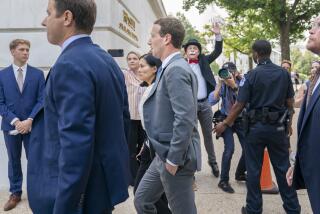States Would Have Voice in High-Tech Council
- Share via
WASHINGTON — The incoming Administration is considering the creation of a science and technology council--composed of experts in the field as well as state and federal officials--to ensure that states are heard during the formulation of federal policies on science and technology issues, sources said.
Such a consultative body would help Washington learn from the diverse experiences of states that sought in recent years to spur their economies by promoting science and technology through such things as funding specific research and development projects and fostering links between businesses, universities and venture capitalists.
While the Ronald Reagan and Bush Administrations viewed such industrial policy-making as anathema, more than 44 states, including California, established more than 250 technology programs during the 1980s, designed to enhance their own industrial competitiveness.
Together, they now spend up to $1 billion annually to support a broad array of research parks, venture capital funds, university-industry consortia, matching grant programs and industrial extension services--all to help companies bring new products and technologies to the market and create jobs in the process.
Because President-elect Bill Clinton has vowed to vigorously promote science and technology policies that will help boost the economy, these “laboratories of democracy” are the reservoirs of important insights and “compelling lessons” on using science and technology to drive the economy, said William G. Wells Jr., a George Washington University professor of management science who was chief of staff to D. Allan Bromley, President Bush’s science adviser.
A proposal to create a federal-state council on science and technology is now on the desk of Commerce Secretary-designate Ronald H. Brown. Transition sources said that the idea has the backing of many top Clinton advisers and is likely to be well-received by Clinton.
A spokesman for Brown said that the appointee would not comment on substantive matters before his confirmation hearings, scheduled to begin today.
Encouraging federal-state coordination on science and technology issues also would fit well with a desire in the Clinton camp to demonstrate early in his Administration a commitment to incorporate the views of states in policy-making, sources said.
The one unanswered question on creating a science and technology council is how soon to do it after Clinton takes office, they said.
“They’re definitely interested in moving on this quickly. But it’s hard to tell where this fits into their overall priority mix,” said one veteran science policy expert with whom transition officials consulted.
“I think they’ll act early,” said Richard F. Celeste, who adopted pioneering science and technology policies as governor of Ohio in the 1980s, most notably the Thomas Edison Program, a state-run consortium that encourages competing high-tech firms to pursue risky technologies by subsidizing their collaborative efforts.
“The thing about science and technology is that it’s a long lead-time activity. It doesn’t always bear fruit in two years, or even four years. But that’s all the more reason to act early. After all, it’s all a part of economic development, and Bill (Clinton) has said his focus is on the nation’s economy. Well, this is a piece of that message,” Celeste said.
Wells said that closer federal-state consultations on science and technology issues would benefit both the nation and its states.
“States and local governments have much more intimate relationships with their local industries than is possible or even appropriate for the federal government, and states are far more capable of reaching small enterprises,” Wells said. “And states can benefit from a federal partnership because they often lack adequate resources and sufficient access to technical information and assistance.”






